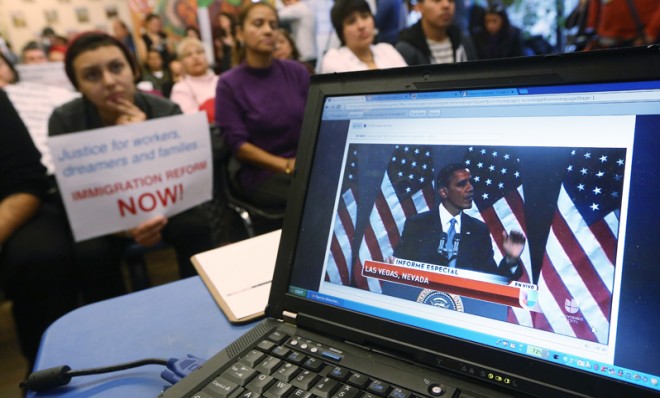How the internet will shape the next generation of American leaders
More and more of our lives are moving online, which will increasingly make maneuvering into political power a tricky prospect

A free daily email with the biggest news stories of the day – and the best features from TheWeek.com
You are now subscribed
Your newsletter sign-up was successful
In discussing the internet, we tend to focus on a few angles: The economic one — using the internet for business innovation; the security angle — protecting the flow of public and private information; and the freedom angle — ensuring the internet exists as a servant of social interest and not as a tool of authoritarian control.
All considerations worthy of our attentive debate.
One that we're neglecting, though, is how the internet will help select the next generation of American leaders.
The Week
Escape your echo chamber. Get the facts behind the news, plus analysis from multiple perspectives.

Sign up for The Week's Free Newsletters
From our morning news briefing to a weekly Good News Newsletter, get the best of The Week delivered directly to your inbox.
From our morning news briefing to a weekly Good News Newsletter, get the best of The Week delivered directly to your inbox.
For a start, consider President Obama's prescient advice for future politicians: "In the YouTube age, whatever you do, it will be pulled up somewhere again later in your life."
You'd better believe it.
Until recently, politicians could reach power relatively assured that their past transgressions would remain in the historical shadows. No longer. In the age of the digital footprint, the borders between our private and public lives are often non-existent. Perception is increasingly defined by our online personalities. The internet has become a critical, undeniable part of our lives, and resistance is futile. Even though some might hope to elude the internet's grasp, if they choose to avoid it, they risk missing crucial opportunities.
And so, physical networking is being superseded by digitized engagement. Twitter, Facebook, and LinkedIn remove the need for face-to-face chit chat; the daunting physical approach has been replaced by a simple click. Ease wins through.
A free daily email with the biggest news stories of the day – and the best features from TheWeek.com
In some ways all of this is a good thing. After all, with a greater digital footprint, it has become a bit more difficult for corrupt or morally deficient political candidates to reach power. The dirt sticks. As the internet assumes the role of an unyielding background check, it's not inconceivable to see an America in which bad conduct is increasingly deterred by the floodlights of digital scrutiny.
But there's also a darker side.
Right now, somewhere in America, a future presidential candidate is online. The internet doesn't forget or forgive the ill he or she might do. A Facebook photo that's amusing today might well be catastrophic for a 2028 campaign. The spin masters of tomorrow will find their power in the data flows of today. For the internet, words, photos, and experience have no evolution. Their reality is defined in the moment and then preserved for posterity. In comes another issue — our expectations.
During elections, some people complain that too much stock is placed in the 'down to earth' factor — whether we can personally relate to a candidate. And don't be mistaken, this is an important expectation, contrary to the opinions of some; it speaks to our desire to elect leaders who share our emotions, instincts, and aspirations. We want to know that whoever answers the 3 a.m. phone call is one of us, not a technocrat. But the internet's omnipresent eye endangers this dynamic. We should, of course, demand integrity from our elected officials, but in requiring candidates to abide by puritanical standards, we risk being left only with professional politicians — those who have molded their images to gain votes rather than receive our honest assessments. Such a change would only further strain our connections to those in power. Over time, the internet would divide our democracy into two groups — the worthy and the impure.
In the years to come, we'll have to balance our expectations of future leaders with cautious understanding. As digital currents swell across the world — the internet becomes a greater force for political empowerment. But as we enjoy this informational bounty, we need to remember that simple adage: No one is perfect.
Tom Rogan is a conservative writer who blogs at TomRoganThinks.com.
-
 Minnesota's legal system buckles under Trump's ICE surge
Minnesota's legal system buckles under Trump's ICE surgeIN THE SPOTLIGHT Mass arrests and chaotic administration have pushed Twin Cities courts to the brink as lawyers and judges alike struggle to keep pace with ICE’s activity
-
 Big-time money squabbles: the conflict over California’s proposed billionaire tax
Big-time money squabbles: the conflict over California’s proposed billionaire taxTalking Points Californians worth more than $1.1 billion would pay a one-time 5% tax
-
 ‘The West needs people’
‘The West needs people’Instant Opinion Opinion, comment and editorials of the day